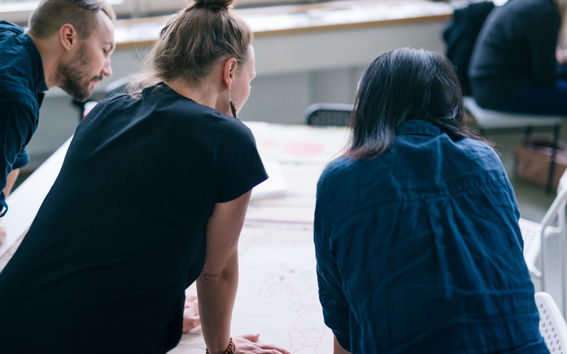Taide, kasvatus ja yrittäjyysajattelu yhdistyvät NoVA:n ja Aalto Venturesin yhteisellä kurssilla
Lue koko artikkeli (englanniksi) alta.

Art, Education & Entrepreneurship LAB
The innovative, critical, and creative potential of art education to impact people has not yet been explored enough in relation to the local and global economies, nor has it been utilised to its full potential as an active partner in creating more sustainable futures. Through the combination of art, culture, education and entrepreneurial thinking we can foster lifelong learning, encourage innovative and creative entrepreneurial innovations that aim at finding ethical technological solutions, provide new and creative solutions to challenging issues, and generate broader impacts in society.
Art, Education & Entrepreneurship course from the NoVA master programme of Aalto ARTS, in collaboration with the Aalto Ventures Programme
Nordic Visual Studies and Art Education (NoVA) at Aalto ARTS organised an intensive pilot course in 2019 in collaboration with Aalto Ventures Programme (AVP) and Teaching Lab, and in partnership with the City of Helsinki. The aim of the course, next offered in 2021, is to have Aalto students from all disciplines join in exploring connections between art, education and entrepreneurship through practical design work, case examples, expert speaker presentations and mentoring.
Entrepreneurship and project management are seen as increasingly important goals for the NoVA study programme at the same time as the Nordic countries are aiming to obtain leadership positions in transitioning societies towards increased sustainability and achieving the United Nations Sustainable Development Goals (SDG). The Art, Education and Entrepreneurship course continues the Aalto ARTS’ interdisciplinary commitment to creating learning and pedagogical models that advance SDG’s 2030, as students not only contemplate arts-based ethical solutions to current social and cultural issues but also explore opportunities for careers and decent job development for diverse people.
How will art education, design, entrepreneurship and arts-based learning support the development of more culturally, socially and ecologically sustainable futures?
The world is changing rapidly and we need to know how to use our pedagogical expertise to initiate and facilitate adjustment to changing cultures and social demands. How, then, will art education, design and arts-based learning support culturally, socially and ecologically more sustainable futures? What are the opportunities for art education to take part in resolving and responding to the challenging issues as the world changes?
When Jaana Brinck, Lecturer and the Head of Nordic Visual Studies and Art Education (NoVA), thinks of the curriculum and the future skills needed by art and culture professionals, she sees tremendous potential for art and art education working alongside the business sector because critical thinking and creativity, central themes in art education, are a major part of the adjustment processes required to thrive whilst everything changes. However, “Using art and entrepreneurship in one sentence causes doubts in people. And some people think that these topics don’t belong together,” Jaana muses.
Jaana Brinck thinks that art educators have a very special perspective on the world: An ethical and aesthetic worldview that is founded on truly important values. “The business world is changing. We think that softer values, lifelong learning and creativity are important values in building a more sustainable future.”
“But how do we actually introduce those skills into our work?” Jaana wonders. She sees that pedagogical experts are needed in all fields. She proposes a further evaluation of what Aalto University’s “Game Changer” rhetoric and strategic goals really are and what they mean in the context of art and art education. “We have a lot to give to different sectors of life and society. However, there are no ready-made structures and we are pioneers in many ways. As such, we need to create those structures for ourselves and for others. It is here that this kind of entrepreneurial thinking becomes essential. We need to be able to communicate the value of our areas of expertise to the world.”
Learning mode: Multidisciplinary team-work, critical arts-based and design practices and an open creative mind-set
In this course, learning extends beyond the so-called traditional classroom. Partnerships with cities and companies are important so students learn to understand that their work is important and may even start conversations in higher-level professional collaborations.
According to Jaana, the best thing about this course is when students begin to see their own potential. She thinks the students are amazing at applying their content expertise in innovative ways. Through opportunities to explore their entrepreneurial identities and with guidance from teachers, experts and peers, students gain confidence and explore whether innovative entrepreneurship might suit them, and further, what entrepreneurship might look like from an arts-based and educational perspective.
“There has been a great need in Aalto ARTS for a course like this,” Jaana Brinck states, continuing: “Quite a number of our students, especially from ARTS, are employed as freelancers or in project work after graduation. However, there is still not much teaching on these themes. Even if they do not start their own business, many people may find themselves working at several part-time jobs. This, too, requires project management skills and entrepreneurial thinking.”
Essential learning goals for the course are to:
- Explore and develop entrepreneurial spirit and business ideas utilising methods from science and the arts.
- Ideate a creative product or service concept for the educational field.
- Process ideas and get feedback for ideas from peers, experts and professionals.
- Work with peers to learn about their experiences as entrepreneurs.
- Learn multidisciplinary team-work and creative design skills.
- Become familiar with and utilise the United Nations Sustainable Development Goals, such as Quality education; Gender equality; Decent work & economic growth; Reduced inequalities.
Written by: Jasmin Järvinen & Anniina Suominen
- Julkaistu:
- Päivitetty:


